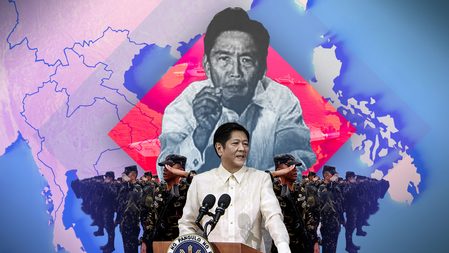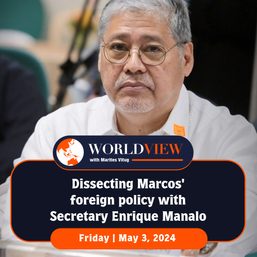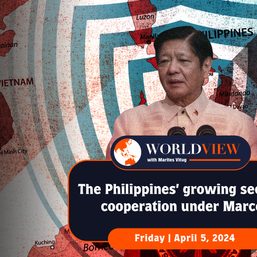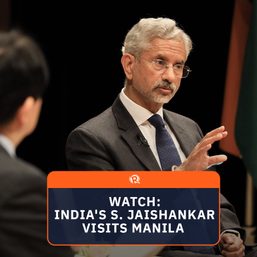SUMMARY
This is AI generated summarization, which may have errors. For context, always refer to the full article.
![[OPINION] A tale of two Marcoses? The big plot twist to Marcos’ foreign policy](https://www.rappler.com/tachyon/2023/11/marcos-foreign-policy-nov-23-2023.jpg)
Before becoming President, Ferdinand Marcos Jr.’s personal and professional connections significantly shaped anticipations and initial perceptions regarding his potential foreign policy and international relations strategies. What unfolded next offered an unexpected twist for his supporters and detractors alike.
Not-so-great expectations
In the lead-up to and during his campaign, Marcos faced expectations regarding his administration’s foreign policy and international relations. Observers anticipated continuity in the Philippines’ China-friendly stance and challenges in his Administration’s international relations, fueled by Marcos’s affiliations, pre-campaign activities, and campaign rhetoric.
First, Marcos’s ties to pro-China individuals, including his predecessor Rodrigo Duterte and his family, signaled a likely continuation of the China-friendly policy. His association with the Duterte family strengthened this perception, particularly running with Sara Duterte as his vice-president. The connection between Marcos and China extends to family history, with the Philippines-China diplomatic relationship starting during his dictator father’s Administration. Imelda Marcos and Marcos Jr.’s meeting with Chairman Mao Zedong further solidified this link. His sister Imee’s pro-China stance added another layer, as well as the presence of a Chinese consulate in a Marcos stronghold.
Second, Marcos was the only candidate to visit the Chinese Embassy before the campaign, triggering interpretations, with some viewing it as a signal of his pro-China leanings. Marcos’s team appeared to downplay it — a strategic response to mitigate backlash.
Third, Marcos presented vague or conflicting responses to international issues during the campaign, which can be attributed to a two-pronged rationale. One, Filipino voters show a higher concern for domestic matters rather than international ones. Two, Marcos’s campaign strategists emphasized their message of unity, mindful of the complexities of foreign policy and international relations, which could lead to missteps.
Doubts within the country mirrored concerns abroad. Questions about Marcos’s capacity to effectively interact with other nations and international organizations were raised. His family background and the human rights violations and abuses during his dictator father’s Martial Law regime, cast a shadow over his ability to serve as the Philippines’ global ambassador.
Influence and intent: Correcting perceptions of Marcos’s diplomatic narrative
Arguably, Marcos didn’t truly alter his approach to foreign policy and international relations when becoming President, but rather, the public had a perception of him and his possible foreign policy and international relations efforts, different from what he and his Cabinet intended to implement. His approach may be attributed to several factors.
First, particularly to his critics, Marcos’s efforts are driven by an ambitious goal: to rehabilitate his family’s tarnished legacy and cleanse their dark history. With this weight, Marcos endeavors to restore their family name, evident in his active involvement with international leaders and forums, where he strives to present himself as a statesman. In doing so, he seeks to create distance from the human rights abuses and economic mismanagement during his father’s regime.
Second, influential figures within Marcos’s circle, such as his uncle, Ambassador Babes Romualdez and cousin, Speaker Martin Romualdez, play pivotal roles. Ambassador Romualdez advocates for strong Philippines-US defense cooperation and Speaker Romualdez consistently supports Marcos’s legislative agenda, emphasizing strengthening the Philippine-US alliance.
Third, China’s persistent assertiveness compelled the Philippines to rebalance its relationship with the US and the West, to safeguard national interests.
Fourth, Marcos’s approach also serves as a corrective measure to the last Administration. Contrasting with the Duterte Administration’s appeasement of China and friction with the West, Marcos aims to reestablish Philippine credibility and steadfastness on the global stage, emphasizing diplomacy and engagement.
Breaking from Duterte’s voyage: Marcos’s own journey
To the surprise of his critics, Marcos’s foreign policy and international relations efforts seemed attuned to domestic priorities and responsive within the evolving global context.
Unlike Duterte’s “independent foreign policy” favoring unconventional partners, Marcos actively engages with the US, expanding defense agreements and approving more military facilities through the Enhanced Defense Cooperation Agreement (EDCA). Marcos also adopted a strong stance in response to China’s continued assertiveness in the South China Sea. He affirmed the Philippines’ commitment to safeguarding its maritime territory and the rights of its fishermen. Since Marcos assumed office, the Philippines has escalated its efforts to counter China’s aggression.
Beyond the US, Marcos has been a proponent of multilateral efforts safeguarding the principles of freedom of navigation and overflight, particularly within the South China Sea. Additionally, he pursued closer partnerships with like-minded nations, such as Japan and Australia, diversifying the Philippines’ strategic alliances.
However, Marcos is aware of China’s influence and role as an economic partner for the Philippines. Rather than seek confrontation, his approach is to encourage peaceful cooperation and reap the economic benefits from China’s growth, even in the face of its economic slowdown. Marcos’s three-day state visit to Beijing last January 2023 and his meeting with Chinese President Xi Jinping during the November 2023 Asia Pacific Economic Cooperation Summit, demonstrate his efforts to maintain the ties between China and the Philippines.
Marcos also conveys a more cooperative approach to regional blocs. Most of his foreign trips were for meetings with international organizations — strategic avenues to rehabilitate the Philippines’ tarnished international image.
Furthermore, Marcos clearly outlines his strategy for engaging with regional groups like the Association of Southeast Asian Nations (ASEAN) and the European Union (EU). Notably, four of his seven official trips in 2022 were dedicated to Southeast Asia, underscoring that the ASEAN remains an essential forum.
Marcos also shifted from his predecessor’s approach, projecting a more diplomatic image towards the EU. The invitation to, and the actual historic visit, of the European Commission President Ursula von der Leyen to the Philippines, sends a message that his administration is different from the previous one.
When addressing critical global issues like the conflicts in Ukraine and Gaza, the Marcos administration appears to be consistent with the national interest of condemning violence and upholding the international rule of law in settling territorial disputes.
Analysts describe Marcos’s foreign policy as pragmatic and responsive to geopolitical dynamics. Nonetheless, he must articulate unambiguous foreign policy objectives rather than attempt to be a “friend to all” – a strategy that is neither feasible nor desirable. He should leverage the Philippines’ relationships to its advantage, remaining cognizant of the potential risks.
‘Echoes’ of the past: Marcos vs Aquino
Upon closer examination, Marcos’ foreign policy aligns more with former President Aquino’s.
Aquino recognized that the ASEAN should be able to deal with issues concerning regional security. Similarly, Marcos actively promotes heightened ASEAN engagement in addressing maritime security issues and transnational crime.
Aquino also adopted close security relations with the US, collaborating extensively on defense and security cooperation agreements like the EDCA. He also pursued a more assertive stance against China, culminating in the 2016 Permanent Court of Arbitration (PCA) ruling favoring the Philippines.
Likewise, Marcos is recalibrating the relationship with the US, while leveraging the Philippines’ 2016 PCA victory against China. However, Marcos still tries to keep China close, moving all major diplomatic ties forward.
Marcos and his team are good at managing perceptions. The effectiveness of his “rebrand” and whether it translates into positive international engagement must be further scrutinized. While some argue that Marcos’ rebranding has improved the Philippines’ global standing, it’s wise to remain cautious. Long-term success, after all, will depend on consistent policy actions and genuine reforms. – Rappler.com
Marie Antoinette Pilapil de Jesus is the Senior Program Manager for Governance and Foreign Relations at the Konrad Adenauer Stiftung or KAS Philippines. She has been an international development practitioner for most of her professional career, focusing on governance and politics, international relations, and economics.
Joshua Uel Juanillo Abad is the Program Manager for Inclusive Economic Development at KAS Philippines. His career as a development practitioner spans the fields of workforce development, education, and economic regulation.
You may reach them at info.manila@kas.de for any comments and feedback. The views and opinions expressed in this piece are solely theirs.
Add a comment
How does this make you feel?

![[OPINION] Marcos Jr.’s foreign policy of ‘strategic selectivism’](https://www.rappler.com/tachyon/2022/08/marcos-strategic-selectivism-august-16-2022.jpg?fit=449%2C449)


![[OPINION] Expectations for Philippines-US-Japan trilateral cooperation: A view from Japan](https://www.rappler.com/tachyon/2024/04/tl-ph-usa-jp-cooperation.jpg?resize=257%2C257&crop=447px%2C0px%2C1080px%2C1080px)


There are no comments yet. Add your comment to start the conversation.